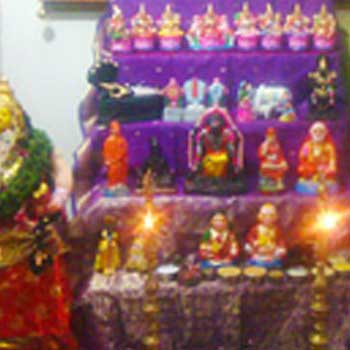Navaratri in Kerala: Celebrating the Triumph of Good Over Evil

Navarathri- a Honour to Goddess Saraswathi
Navaratri, which literally translates to nine nights, occurs annually in or October. During these nine days, devotees worship the nine forms of Goddess Shakthi/Devi. In the Malayalam calendar, Navaratri is celebrated during the month of "Kanni" (September). This festival is observed differently across various regions of India. In Kerala, the last three days—Durga Ashtami, Mahanavami, and Vijayadashami—are dedicated to Goddess Saraswati, the deity of wisdom and learning.
Navaratri stands as one of the most significant Hindu festivals, symbolizing the victory of good over evil. Throughout this period, Durga, Lakshmi & Saraswati are revered as distinct manifestations of Shakti, or cosmic energy. Initially, for the first three days, Durga is invoked as a powerful force to eliminate impurities and vices. Following this, for the next two of days, Lakshmi is worshipped as the giver of spiritual wealth and prosperity.
The final three days focus on venerating Saraswati—the goddess of wisdom. To achieve comprehensive success in life, blessings from all three aspects of the divine mother are sought over these nine nights. Specifically, Durgashtami, Mahanavami, and Vijayadasami are considered particularly sacred for Devi worship.
In Kerala’s celebration of Navaratri, various ceremonies take place including Saraswati Puja and Ayudha Puja. On Durgashtami evening, a ceremony called Poojavaipu is conducted where all studies and skilled work are paused prior to it. The subsequent day being Mahanavami is wholly devoted to Saraswati through morning and evening pujas.
On Vijayadasami morning after a puja session, books and tools are ceremonially removed from their rooms in an act known as 'Puja Eduppu'. This marks the resumption of learning & work. Additionally, on Vijayadashami across many temple premises another special event known as Vidyarambham takes place signaling children’s initiation into the realm of knowledge by writing their first alphabets on rice or sand under guidance from elders or teachers.
Certain communities celebrate all Navaratri days by displaying images of gods along with varied animals & toys in an exhibition called ‘Koluvaipu’.
FAQs:
What is Navaratri and when is it celebrated?
Navaratri, meaning "nine nights," is celebrated annually in September or October, honoring the nine forms of Goddess Shakti.
How is Navaratri observed in Kerala?
In Kerala, the last three days—Durga Ashtami, Mahanavami, and Vijayadashami—are dedicated to Goddess Saraswati, focusing on wisdom and learning.
What rituals are performed during Navaratri in Kerala?
Key rituals include Saraswati Puja, Ayudha Puja, Poojavaipu on Durgashtami, and Puja Eduppu on Vijayadasami, marking the resumption of studies and work.
What is Vidyarambham?
Vidyarambham, observed on Vijayadasami, is a ceremony where children begin their journey of learning by writing their first letters in rice or sand.
What is the significance of Koluvaipu during Navaratri?
Koluvaipu involves displaying images of gods, animals, and toys, symbolizing the diversity of creation and devotion during the festival